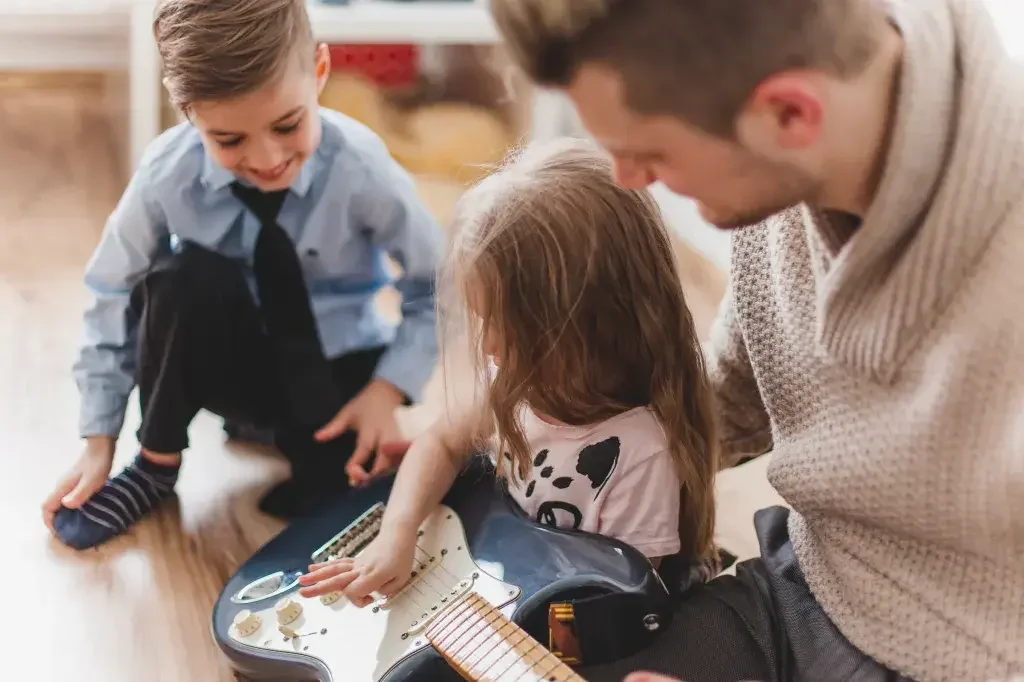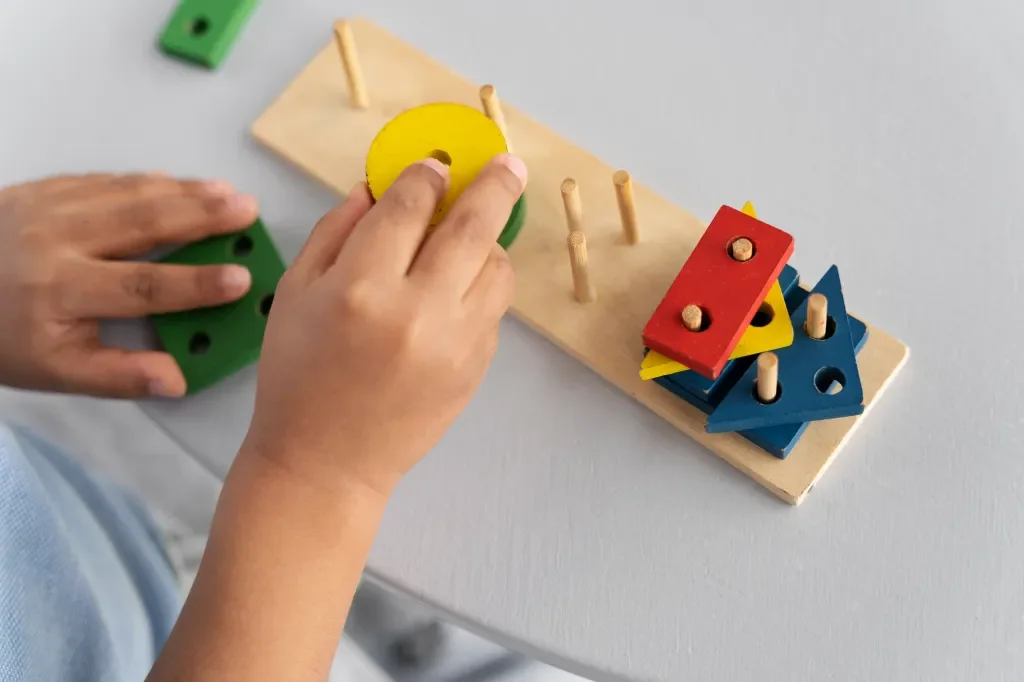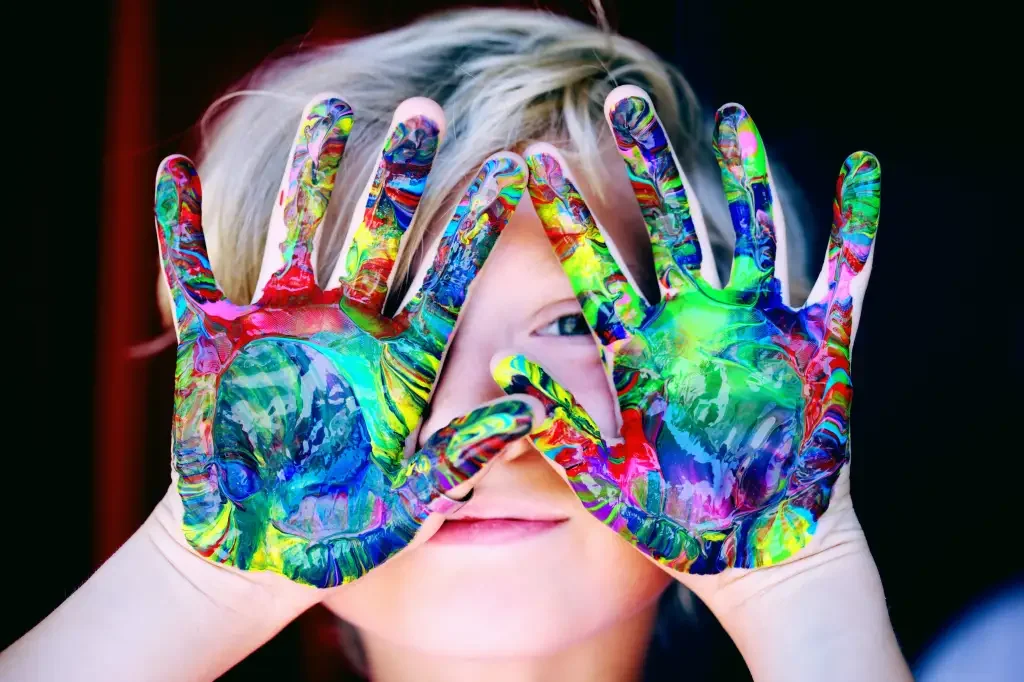7 Reasons Parents Prefer Montessori Daycare and Preschool
Families often choose a Montessori preschool because it gives children the freedom to explore, solve problems, and build confidence in a calm, organized space. Montessori childcare settings offer thoughtful routines and materials that help toddlers and preschoolers grow at their own pace. Here are 7 of the most important reasons for choosing a Montessori education.
1. Children Build Independence Through Daily Tasks
Montessori environments introduce simple routines that help children care for themselves and their surroundings. Tasks like putting work away or preparing snack items build confidence and create smoother transitions at home.
2. Emotional Development Is Supported Through Respectful Guidance
Teachers use warm, responsive interactions to help children identify feelings and practice self-regulation. The American Academy of Pediatrics highlights howearly caregiver responses support emotional and behavioral development.
3. Hands-On Learning Strengthens Cognitive Skills
Preschoolers use materials designed to help them sort, compare, and explore patterns. These activities reinforce early math and language concepts. Children gain focus through repetition, which strengthens concentration and reasoning.
4. Montessori Daycare Encourages Purposeful Movement
Classrooms allow children to move freely between activities. This supports motor coordination and physical confidence. Research shows that early learning environments with structured movement help children build stronger physical and cognitive foundations. For Montessori, a prepared environment is at the root of the learning process.
5. Practical Life Activities Prepare Children for Real Tasks
Pouring water, sweeping small messes, and matching objects teach coordination and responsibility. These activities introduce early problem-solving while encouraging children to take pride in meaningful work. Additionally, practical life skills are ideal for practice at home, providing a connection between school and family life.
These activities also support:
Fine motor control
Order and sequencing
Confidence through repetition
6. Montessori Preschool Strengthens Social Skills
Mixed-age groups help children practice patience, empathy, and cooperation. Younger students learn from older peers, while older children gain leadership experience in a natural way. Calm, predictable routines help children navigate social moments with confidence.
7. Families Appreciate Predictable, Child-Centered Routines
Across the Bay Area, parents notice how consistent schedules and thoughtful classroom design reduce frustration and support smoother daily rhythms. A recent review of early childhood programs shows that predictable routines help children build emotional security and readiness for learning. These habits give preschoolers the structure they need to explore confidently.
Key Takeaways
Before looking at the core points, it helps to see how these ideas work together in a Montessori setting. The takeaways below highlight the routines, materials, and teacher interactions that shape a child’s daily experience. They also show how Montessori preschool supports steady growth across emotional, social, and cognitive skills. Parents often prefer Montessori daycare and preschool because it offers:
Calm environments that support independence
Hands-on materials that build focus and problem-solving
Respectful teacher guidance rooted in emotional development
Montessori preschool is a learning adventure for children. Because the Montessori Method puts emphasis on tasks that children can choose and use on their own, kids have fun without realizing the educational value of the activities they use.
How Montessori Preschool Builds Problem-Solving Skills
A Montessori preschool environment encourages children to observe, explore, and work through challenges at their own pace. These early experiences help young learners develop steady confidence as they experiment with ideas, refine motor skills, and collaborate with peers. Families often notice how quickly children become curious thinkers once they begin exploring practical materials.
The Problem: Young Learners Need Guided Opportunities to Think Independently
Preschoolers naturally ask questions as they encounter new situations. However, many early learning environments offer limited chances to practice open-ended problem-solving. When children are directed too quickly, they miss opportunities to strengthen reasoning, persistence, and creative decision-making. Research from Harvard’s Center on the Developing Child explains that early serve-and-return interactions shape the brain systems involved in memory and flexible thinking.
The Montessori Solution: Hands-On Exploration With Purposeful Materials
Montessori classrooms invite children to solve problems through experimentation. Practical life trays, sensorial materials, and early math tools are designed to present a challenge, then guide children toward self-correction. This approach supports independence while reinforcing attention and emotional regulation. A closer look at Montessori’s practical life activities shows how meaningful tasks build essential cognitive habits.
Children strengthen problem-solving through tasks like:
Matching shapes and refining categories
Sequencing objects by size or color
Choosing tools that support early writing or counting
These choices help preschoolers observe patterns and explore solutions in a calm, predictable space.
How Montessori Preschool Builds Reasoning Step by Step
Montessori environments provide structured challenges that grow with each learner. The following sequence shows how children practice problem-solving daily:
They choose a material that interests them.
They explore the task by observing, touching, and testing steps.
They identify what works and adjust when something does not work.
They repeat the task to confirm their understanding.
This process strengthens memory, persistence, and coordination. The CDC notes that preschool-age children develop stronger planning and reasoning between ages four and five, especially when encouraged to explore independently.
Local Context: How Montessori West Supports Preschool Thinking Skills
Across the Bay Area, families appreciate how Montessori West classrooms provide calm spaces where children can solve problems without pressure. Teachers guide with questions that help children think through possibilities and reflect on their choices. These habits build confidence that carries into early reading, math, and social experiences. The structured yet flexible environment allows preschoolers to master practical skills, manage emotions, and collaborate with peers.
Key Takeaways
Montessori classrooms are designed to assist children in learning. Through self-correcting activities, they become familiar with the process of critical thinking. Problem-solving develops naturally when preschoolers experience:
Hands-on task exploration
Predictable routines that support focus
Thoughtful teacher guidance
Opportunities for independent decision-making
Montessori preschool encourages children to move through challenges with curiosity and purpose. With individual guidance, a prepared environment, and self-guided activities, children learn to think about their actions and build critical thinking skills that help them learn and grow.
The Science Behind Montessori and How It Works for Every Child
What makes Montessori education so effective for children of every temperament and learning style? Scientific research increasingly supports what Dr. Maria Montessori observed more than a century ago: children learn best when they move freely, make choices, and explore real materials in a structured environment. In a Montessori preschool classroom, every material and activity is designed to connect curiosity with focus. This fusion of independence and intention is what distinguishes Montessori from traditional instruction and what continues to fascinate psychologists today.
Discovery Builds the Brain
Recent neuroscience reveals that learning through movement and choice strengthens the same brain regions responsible for self-control and problem-solving. Each activity in a Montessori preschool program isolates a single concept such as weight, texture, quantity, color, or sound, so the brain can study relationships deeply instead of memorizing surface details. When a child repeats an action until mastery, neural pathways are reinforced through myelination, the process that turns trial into skill.
This hands-on repetition also improves executive functioning. Children who pour, sort, and count develop precision and patience before they even realize they are practicing math and coordination. The quiet order of the classroom supports focus in ways lectures cannot. What seems simple—transferring beans with a spoon or matching shapes by feel—is actually building the foundation for abstract reasoning and problem-solving later in life.
Teachers as Guides, Not Directors
Montessori educators prepare the learning environment. Their role is to observe and respond, stepping in only when a student truly needs redirection. This model of “freedom within limits” nurtures independence and self-correction, two qualities linked by research to stronger academic resilience. When children recognize that errors are part of learning, anxiety decreases and curiosity increases.
Classrooms function as mini-communities where respect and responsibility grow naturally. Students learn to wait their turn for materials, tidy their workspace, and assist peers. These moments of cooperation are powerful social lessons that extend beyond the classroom walls.
A Prepared Environment That Teaches Itself
Every detail of a Montessori classroom is intentional, from the natural lighting and open shelving to the child-sized furniture that encourages autonomy. Psychologists call this a “responsive environment,” one that adapts to developmental readiness. When a child chooses to pour water, polish brass, or trace sandpaper letters, the activity stimulates the senses and builds neural networks that connect motion with memory.
A 2022 longitudinal study in Frontiers in Psychology found that Montessori students outperformed peers in language, math, and social-emotional regulation. Researchers concluded that the method’s self-paced structure and extended work cycles reduce cognitive overload while promoting calm focus. In other words, the Montessori classroom itself operates like a scientific experiment in learning efficiency, constantly refined by observation and response.
Nurturing the Whole Child
Montessori education treats intellect, emotion, and character as inseparable. Grace and courtesy lessons teach empathy, cooperation, and kindness, values that thrive in the absence of competition. Families who join an educational organization like Montessori West often notice a positive transformation: children become more confident, patient, and capable of sustained concentration at home as well as at school.
By trusting children to make meaningful choices, Montessori empowers them to see learning as a joyful, lifelong process. The evidence behind it is clear, but the real proof appears every day in the calm confidence of students who know how to learn, lead, and care for others.
5 Practical Life Skills Every Montessori Preschooler Masters
Practical life lessons are the heart of Montessori preschool programs. These exercises give children confidence and self-direction long before academic lessons begin. Tasks that adults might consider routine become meaningful challenges for young learners. They help children strengthen coordination, patience, and responsibility through everyday activities that translate naturally into independence at home and school.
One reason these activities matter so much is that they satisfy a child’s natural desire to contribute. When children pour water, button a sweater, or sweep the floor, they see immediate results. The process is joyful because it gives them real control over their environment. The Montessori classroom is carefully designed to encourage this sense of purpose while providing just the right amount of challenge.
Pouring and Transferring
Children begin with large materials such as beans or rice before progressing to liquids. They learn to control movement, correct spills calmly, and repeat until they achieve balance. This simple sequence develops concentration and hand-eye coordination, skills that support writing and self-feeding later on.
Dressing Frames and Self-Care
Fastening buttons, zipping jackets, and tying shoelaces are milestones in a young child’s growth. Montessori preschool dressing frames allow repeated practice in a calm setting. Each repetition builds independence and fine-motor strength. The result is pride in being able to care for oneself, which is a foundation for lifelong self-reliance.
Cleaning and Care of the Environment
Children take turns dusting shelves, watering plants, and sweeping floors. These routines teach respect for shared spaces and an understanding of community responsibility. The environment stays beautiful because everyone contributes. Teachers model each task patiently until it becomes second nature.
Grace and Courtesy
Courtesy lessons show children how to greet others, wait their turn, and listen politely. These moments nurture empathy and respect. In a Montessori preschool, social skills are treated with the same importance as math or reading readiness. A child who can communicate kindly is prepared to succeed in any learning environment.
Food Preparation and Table Service
Children slice bananas, spread butter, and pour juice using child-sized tools. They learn to set tables, serve friends, and clean up afterward. These experiences connect practical action with social warmth, transforming mealtime into a moment of cooperation and gratitude.
Broader Developmental Benefits of Montessori Activities
Beyond individual tasks, common Montessori activities nurture growth across multiple developmental areas. Each carefully chosen exercise stimulates mental focus, emotional balance, and problem-solving ability. As children gain competence through repetition and responsibility, they build lifelong habits that support cognitive and social well-being.
Cognitive Growth: Sorting, pouring, and sequencing tasks strengthen concentration, memory, and logic.
Emotional Regulation: Predictable routines and calm repetition build patience and self-control.
Social Development: Partner work, turn-taking, and shared materials encourage cooperation and empathy.
Physical Coordination: Fine and gross motor exercises enhance strength, control, and endurance.
Together, these five skills and broader developmental benefits illustrate the heart of Montessori education. Practical life work is more than classroom housekeeping; it is purposeful learning that builds independence, concentration, and respect. Each mastered skill represents a step toward confident participation in daily life. Through the structure of a Montessori toddler program, children discover that they are capable, valued, and ready to explore a larger world.
What Parents Should Know About Montessori Kindergarten Readiness
Kindergarten readiness looks different in a Montessori preschool than it does in a conventional classroom. The focus centers on independence, concentration, coordination, and social grace. These capacities grow through daily work with real materials, gentle routines, and respectful guidance. When parents understand the signs to watch for, they can support development at home and feel confident about timing the move into the next learning stage.
What Readiness Means in Montessori
Readiness is the child’s ability to manage practical tasks, sustain attention, and participate constructively in a community. A ready child chooses work, completes cycles, and cares for materials without constant reminders. The child communicates needs with patience and responds to simple multi-step directions. These markers suggest a growing sense of order and responsibility, which helps the first year of kindergarten feel calm and successful.
Readiness Indicators You Can Observe at Home
Consistent patterns will indicate that preschool children are ready to advance. Notice whether your child dresses with minimal help, tidies play spaces, and returns items to their places. Watch for longer stretches of focused play and a willingness to try again after small mistakes. Observe turn-taking with siblings or friends, kind greetings, and problem-solving with words. These habits mirror classroom expectations and reduce first-week stress.
How Montessori Preschool Builds These Capacities
The Montessori preschool environment offers long, uninterrupted work periods that train attention. Practical life exercises strengthen coordination and self-care. Sensorial materials refine perception and prepare the mind for language and math. Grace and courtesy lessons model greetings, apologies, and conflict resolution. Step by step, children learn to plan, act, reflect, and adjust. This cycle of autonomy and feedback forms a durable foundation for kindergarten.
Common Misunderstandings, Clarified
“Readiness is academic drill.” In Montessori, readiness begins with independence, concentration, and social ease.
“Kindergarten requires strict adult control.” Montessori demonstrates that clear routines and self-management lead to calm cooperation.
“Children should accelerate content quickly.” Depth and mastery matter more than speed, which protects confidence and curiosity.
Partnering With Guides and Families
Readiness grows fastest when school and home speak the same language. Parents who provide predictable routines, child-sized tools, and time for unhurried practice see steady progress. Guides can share observations from the classroom, such as how a child chooses work or resolves conflicts. Families can echo those skills at home with simple responsibilities and warm feedback that highlights effort and improvement.
Timeline and Next Steps
Every Montessori child’s path unfolds at a natural pace. Families can review growth over several weeks, noting consistent gains in attention, self-care, and social skills. Short visits to the kindergarten environment, quiet observation, and conversation with the guide provide valuable insight. With a clear picture of strengths and needs, the transition plan feels supportive and calm for the child and reassuring for the family.
Kindergarten readiness in a Montessori preschool is the sum of many small victories. Children who manage themselves, focus with purpose, and care for their environment arrive prepared to learn with joy. When home and school nurture these habits together, the first year becomes a season of growth marked by curiosity, steady effort, and genuine pride in meaningful work.
7 Montessori Baby Activities That Build Early Independence
Even the youngest learners can begin building independence through gentle, hands-on exploration. A Montessori toddler program encourages families to nurture self-confidence long before formal schooling begins. Infants and young toddlers thrive when their environment invites them to move, reach, and discover safely. These seven Montessori baby activities help parents and caregivers introduce purposeful learning at home while respecting each child’s natural rhythm of growth.
Reaching and Grasping Exercises
Place lightweight, natural objects within easy reach during supervised floor play. Cloth rings, wooden rattles, and soft scarves encourage babies to reach, grasp, and release with control. These early motions strengthen hand muscles and hand-eye coordination. The joy of movement lays the foundation for later tasks like pouring and spooning in the Montessori classroom.
Floor Time on a Movement Mat
Instead of keeping infants confined to swings or seats, Montessori toddler programs recommend open floor space with a soft mat. Babies can roll, stretch, and crawl freely. This freedom supports balance and spatial awareness. When children learn to move their bodies independently, they also begin developing confidence in decision-making and exploration.
Object Permanence Box
A wooden box with a small opening and matching ball teaches babies that objects still exist when out of sight. Each time the ball disappears and reappears, children experience cause and effect. This discovery builds concentration and curiosity. Simple materials and repetition help babies focus for longer periods while enjoying the challenge of mastery.
Mirror Observation
A low, unbreakable mirror placed beside a mat allows babies to watch their reflections. They begin noticing facial expressions, movements, and emotions. This awareness nurtures social understanding and self-recognition. Over time, mirror play supports language development because babies connect sound, sight, and emotion in a meaningful way.
Treasure Basket Exploration
Fill a shallow basket with safe, everyday household objects made of natural materials such as wood, fabric, or metal. Babies explore textures, temperatures, and sounds through touch and taste. The basket provides endless opportunities for sensory learning. Parents can rotate the contents weekly to maintain interest and stimulate curiosity.
Practical Participation During Care Routines
Even diapering and dressing can become lessons in cooperation. Invite the child to lift arms, hold a wipe, or choose between two outfits. These small decisions encourage autonomy. When babies participate actively, they begin viewing themselves as capable contributors. Each shared routine becomes a moment of connection rather than a task performed for them.
Early Food Preparation Activities
When babies transition to solid foods, they can help in simple ways. Allow them to hold a banana while you slice or stir oatmeal together with a child-safe spoon. These sensory-rich moments teach patience, coordination, and respect for food preparation. Children learn through repetition that their actions create real results.
Independence begins with the smallest gestures of trust. Through these gentle Montessori activities, babies learn that their efforts matter. The structure of a Montessori toddler program continues this journey by guiding children toward purposeful action, respect for their environment, and confidence in their growing abilities.





